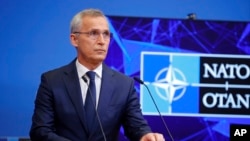When top NATO leaders meet in Spain next week, the debate will be dominated by ways to prevent the Ukrainian War and Russia's further invasion in Europe.
But recent signs are that the Western military alliance is trying to expand its focus to the east. The NATO summit will address the challenges raised by China, perhaps in a more direct way than any previous meeting.
For the first time, the NATO Summit will be attended by top leaders from four Asian countries: Japan, South Korea, Australia and New Zealand. No NATO member states, but each is wary of China's growing influence and coercion.
Since 2020, NATO has strengthened its cooperation with four Asian democracies called "Asia-Pacific Partners".
This involvement was aimed at NATO's focus on the collective defense of its member states in North America and Europe.
However, due to China's growing global presence and expanding military cooperation with Russia, NATO ignores it.
Many observers say that NATO will not accept Asian countries as members, but the alliance's new Asian focus will probably continue.
"I don't think NATO is now. It will expand into the Indo-Pacific and create a new Asian NATO-like organization," said Zsuzsa Anna Ferenczy, a former political adviser to the European Parliament.
"But I look forward to working with [Asia]. Countries facing the increasing threat of China's economic coercion and aggressive behavior vior… are not only in the United States but also in Europe. It will also converge more and more with democracies, "said Ferenczy, an assistant professor at National Dong Hwa University in Taiwan.
Europe afflicts China
NATO's shift to the east reflects not only intensifying competition between the United States and China, but also a change in Europe's attitude towards Beijing. doing.
For decades, Europe has prioritized stable relations with China, which overtook the United States in 2020 as the European Union's largest trading partner.
However, China's view of Europe has deteriorated under the leadership of Chinese Communist Party Prime Minister Xi Jinping. The Xi Jinping administration is more authoritarian at home and more aggressive abroad.

Xi is also steadily expanding China's military presence beyond its coasts, especially in the South China Sea, as a military outpost against opposition from neighboring countries with overlapping territorial disputes with China. I created a base.
As part of a new "wolf warrior" approach to diplomacy, China has revealed retaliation against countries that criticize Beijing or enact policies against its intentions.
After Lithuania opened a de facto embassy in Taiwan, Beijing regarded it as its territory, and China downgraded diplomatic relations and imposed a trade boycott equivalent. The unannounced embargo affected not only Lithuanian products, but also products from other European countries incorporating Lithuanian parts.
Pandemics have also helped to worsen relations between Europe and China. China has been accused of not fully cooperating with the World Health Organization's investigation into the origin of the coronavirus that first appeared in central China. Instead, media controlled by the Chinese government suggest that the virus has occurred elsewhere, such as in the United States and Italy.
Changes in NATO's approach
The growing skepticism of Europe against China can also be seen in NATO's recent history.
In 2019, China was included in NATO's statement for the first time, but Beijing was just one sentence, "presenting both opportunities and challenges."
By 2021, NATO's tone has changed. A joint communiqué published in Brussels stated that China presents "a systematic challenge to a rule-based international order." The
statement also condemned China's "forced" policies, "opaque" military modernization, the use of "disinformation", and military exercises with Russia in the Euro-Atlantic region.
The main reason for NATO's more combative tone is the Ukrainian war in line with Beijing and Moscow, which declared an "unrestricted" partnership.
Just weeks before Russia's invasion of Ukraine, Xi and Russian President Vladimir Putin meet in Beijing, where they announce extensive plans to counter Western influences around the world. did.
Since the invasion of Russia, China has tried to describe itself as a neutral party. However, many European observers have pointed out that China has consistently defended Russia from global criticism and instead accused Washington of engaging in the "Cold War thinking" that caused Moscow. I'm not convinced.
Pierre Morcos, a visiting researcher at the Center for Strategic and International Studies, said the Ukrainian conflict "confirmed the expansion of strategic reconciliation between China and Russia."
"The war in Ukraine also shows that the Euro Atlantic and Indo-Pacific regions are deeply interrelated. A crisis in one region can have serious implications for another. There is sex, "he said.
Explains why like-minded Asian countries are eager to support Ukraine and play an active role in opposition to Russia, Morkos said. rice field.
"I think there will be more coordination and talks between NATO and these countries to not only discuss the aftershocks of the war, especially in Ukraine, but also to exchange China's capabilities and activities. "He added.
At a forum earlier this week, NATO Secretary-General Jason Stoltenberg argued that the alliance did not consider China an adversary. But he suggested that the upcoming summit would bring a statement admitting that "China poses some challenges to our values, our interests, and our security."
China responded angry to NATO's eastern focus. At a briefing by the Chinese Ministry of Foreign Affairs on Thursday, spokesman Wang Wenbin accused NATO of making "very dangerous" efforts to create hostile blocks in Asia.
"NATO has already disrupted Europe's stability," he said. "It should not try to do the same for Asia Pacific and the whole world."


